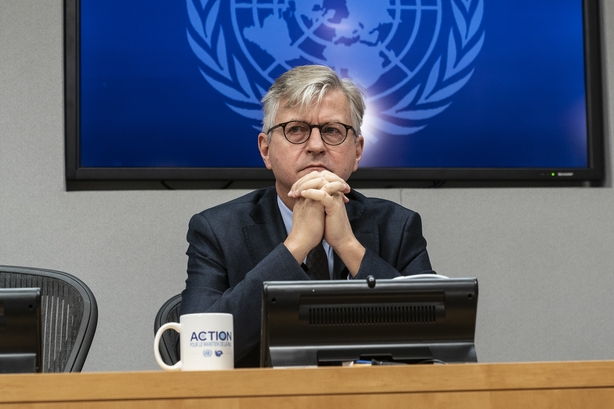Tension is rising along the border between Israel and Lebanon where UN peacekeepers, including 319 Irish troops, are deployed.
There have been daily exchanges of fire between Israeli forces and the Hezbollah militants since the outbreak of the Gaza conflict, raising fears of a wider regional conflagration and heightening the risk of peacekeeper casualties.
Two peacekeepers, from Ghana and Nepal, have already been injured in separate incidents.
"The possibility of a miscalculation or mistake is increasing," Andrea Tenenti a UNIFIL (United Nations Interim Force in Lebanon) spokesperson told RTÉ News, "and that could lead to devastating consequences for the region".
In October, the UN peacekeeping mission headquarters in Naqoura was hit with a rocket. An investigation into the attack is ongoing.
Then in late November, a UNIFIL patrol was hit by Israeli gunfire. UNIFIL reported that no peacekeepers were injured but their vehicle was damaged. UNIFIL called the attack "deeply troubling".
Mr Tenenti said that peacekeepers were regularly forced to take shelter in bunkers during active shelling but that troops were still operational, patrolling the border and assisting local communities.
"I have got to maintain force protection as a priority, while also carrying out the mission," said Lieutenant Colonel Stephen MacEoin, battalion commander of the Irish and Polish soldiers stationed at Camp Shamrock in the village of Tiri, near Lebanon's southern border with Israel.
"As soon as the operational situation allows, we are back out on the road, liaising with the local people and keeping eyes on the Blue Line," he said referring to the 120km demarcation line, drawn by the United Nations, to which Israeli forces withdrew to when they left south Lebanon in 2000.
The rising risks for peacekeepers in Lebanon and other missions around the world will be on the agenda at a high-level conference on UN peacekeeping which starts today in Accra, Ghana.
84 UN members states including Ireland are expected to attend the ministerial meeting which is held every two years. This year's marks the 75th anniversary of UN peacekeeping.

Speaking to RTÉ News ahead of the meeting, UN Under Secretary General for Peace Operations Jean-Pierre Lacroix said that peacekeepers were facing a "deteriorated political and security environment" and that the UN had to "seek new ways of addressing these challenges".
It has been increasingly difficult for the UN to agree new peacekeeping mandates due to divisions between member states on the Security Council. Mandate renewals are also increasingly fraught.
Peacekeeping missions also rely on the consent of the host country. Once that is withdrawn, peacekeepers have to leave.
Just this year, the UN peacekeeping mission in Mali was forced to begin a drawdown of all its troops and civilian personnel following a request by the Malian transitional military government.
"I think that a divided membership and particularly a divided Security Council is a challenge not only to peacekeeping but to every single UN activity in areas of peace and security," Mr Lacroix said, "because we're only as strong as the unity and support of our member states".
He acknowledged that some peacekeeping missions had been undermined by cases of sexual exploitation and abuses carried out by peacekeepers.
"I think we are more equipped to deal with these cases in the sense that there is more awareness from member states and we have taken very robust measures in the past," he said.
"I think we're also better positioned to make sure that these allegations of abuse are brought to our knowledge, but I think there's more to do," he said.
With the deteriorating geopolitical environment, Mr Lacroix said peacekeeping would need to adapt but he said he believed UN member states would stay committed to UN peacekeeping.
"Our peacekeepers are often making the difference between life and death for hundreds of thousands of civilians," he said, "but also preserving ceasefires or doing their best to prevent escalation, which is what our peacekeepers in UNIFIL in southern Lebanon are doing."
Ireland has been consistently very supportive of UN peacekeeping, he added.
"I am quite confident that Ireland will continue to be engaged," he said.







